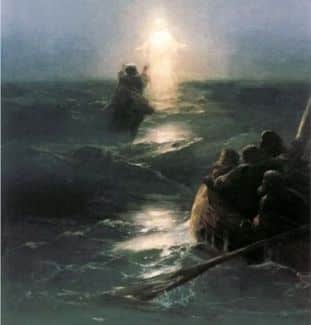
There’s an old joke about a middle-aged adult talking to his parents: “When I was a teenager, you didn’t know anything. But as I’ve gotten older, you’ve gotten smarter and smarter.” The joke is, of course, that — as children, teenagers, or even young adults — we can’t understand the truth of something that’s in front of our faces: that our parents are actually pretty smart, and have valuable life lessons to impart if only we’ll listen. It’s only as we get older, wiser, and (often) more humble do we realize truths that has been in front of us all along.
This came to mind as I reflected on today’s readings. I tend to first read the selections a week or so in advance, and there was one line from the Gospel selection from Mark that just kept sticking with me, for days. In the incident, Jesus is seen by his disciples walking on water, and they’re terrified. He says to them: “Take courage, it is I, do not be afraid!” He gets in the boat with them and the wind dies down: “They were completely astounded. They had not understood the incident of the loaves. On the contrary, their hearts were hardened.”
Think about that. They see proof positive of a miracle in their midst — shortly after having been part of another miracle (the Feeding of the Five Thousand) — and their reaction is for their hearts to be hardened?!
I’m trying to make sense of this, and it’s difficult. For nearly all of us, the idea of Christ as Lord has been at least part of the cultural backdrop for our entire lives. For perhaps most people reading this, the acceptance of Jesus as God, the notion of the Trinity, the basic tenets of faith . . . those have been with us since our earliest memories.
But for those earliest disciples, this was all new to them. They had to come to realize something that seemed impossible, totally readjusting their worldview. And I imagine that was really scary and difficult. It’s quite likely that — even in the face of overwhelming evidence — the easiest thing to do is to pretend that, nope, it didn’t happen, or it doesn’t mean what we think it means. It’s similar to how someone in dire financial trouble may run their household’s numbers, look at a stack of bills, and then decide to go out to eat at an unaffordable restaurant; it doesn’t make sense financially, but it’s the only way they can think to cope (or not cope) with the new reality that’s in front of them.
This incident from Sacred Scripture sticks with me when I think about my interactions with some atheists. Those who don’t believe often point to the absence of proof (as they define it) as proof that God doesn’t exist. But the disciples had proof in front of them, and still their hearts were hardened. I look at the blessings in my life and the nature of the universe, and I can’t help but believe in God; those who don’t believe can look at similar blessings in their own lives and yet remain “blind” as to what they mean.
Our inability to understand evidence that’s in front of us isn’t proof that the evidence doesn’t exist, any more than a child’s inability to understand their parents’ wisdom is “proof” that the parents have no wisdom. Moreover, the daily evidence that parents may present of their intelligence and wisdom can just cause some children to further “harden their hearts” about that evidence, clinging to the falsehoods they believe to be true.
If you’re looking for an action item for today, I recommend trying to place yourself in the shoes of those earliest disciples. Think about the miracle they saw, and how they reacted. Then reflect on your own life. Are there any truths about the Faith, God’s blessings, or what He wants from us that you’ve been ignoring or “hardening your heart” to, despite all evidence to the contrary? Perhaps see if your heart can thaw. Is there someone else in your life with a hardened heart who is ignoring evidence that’s clearly plain to you? Consider praying for them, and remain available to them as your own heart calls you.
Our senses are not independent entities. They rely on our mind to process the information they provide, and our heart to discern what to do with it. God gave us all three: senses, mind, and heart. It falls to us to make sure that none of them are hardened to his love and message.
Today’s readings: 1 Jn 4:11-18; Ps 72:1-2,10,12-13; Mk 6:45-52
